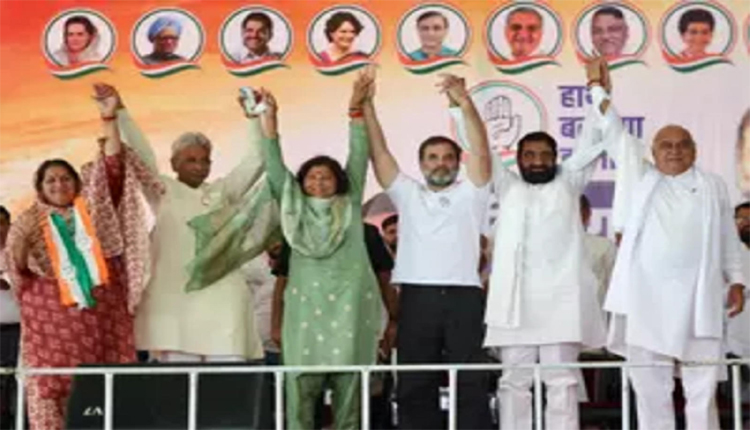Chandigarh: The Congress Party has suffered a major defeat in the Haryana Assembly elections, losing for the third time in a row. The party, which had hoped to return to power, managed to secure only 37 seats, while the Bharatiya Janata Party (BJP) surged ahead with 48 seats, ensuring a majority. This result echoes the party’s defeat in the Madhya Pradesh elections late last year, where overconfidence and solo strategies led to significant losses.
In Haryana, much of the responsibility for Congress’s failure is being placed on former Chief Minister Bhupinder Singh Hooda, who played a central role in shaping the party’s strategy. From ticket distribution to campaign decisions, Hooda’s influence was evident in every major decision by the Congress high command. He repeated 25 sitting MLAs and aimed to fortify his own position rather than prioritising the party’s broader prospects. Though Hooda himself won his seat from Garhi-Sampla-Kiloi, his one-man approach has been seen as sinking the party’s chances statewide.
Hooda’s approach is being compared to that of Kamal Nath in the 2023 Madhya Pradesh elections. Both leaders, close to the Congress high command, chose to go it alone, dismissing potential alliances. In Madhya Pradesh, Kamal Nath’s decision to reject an alliance with the Samajwadi Party (SP) contributed to Congress’s defeat, as the BJP swept the state, winning 163 of 230 seats. Similarly, in Haryana, Congress declined an opportunity to join forces with the Aam Aadmi Party (AAP) and SP, both of which had expressed interest in an alliance.
The AAP had requested just 10 seats out of the 90 in Haryana, while SP sought 2-3 seats. However, Congress’s overconfidence in a solo victory led to the decision to contest alone. This decision, as political analysts now point out, may have been a crucial error. The AAP’s vote share in Haryana, while modest at 1.79 percent, could have been a decisive factor in preventing a split of opposition votes. Instead, the division of votes worked in the BJP’s favour, allowing them to consolidate their position and secure a majority.
The impact of this divided opposition was already visible in the Lok Sabha elections earlier this year, when both Congress and AAP were part of the INDIA alliance. Out of Haryana’s 10 Lok Sabha seats, Congress contested nine while AAP ran on just one seat. Congress managed to win five seats in those elections, a result that indicated the potential power of a united opposition. Had a similar alliance been forged in the Haryana Assembly elections, many believe the outcome might have been different.
Adding to Congress’s troubles was the silent section of voters in Haryana, who were unwilling to support Bhupinder Hooda’s return. The BJP also capitalised on the support of the 14 percent of voters from the deprived Scheduled Castes (DSC), a group that the BJP government has strategically engaged. These voters largely shifted to the BJP, further diminishing Congress’s chances of regaining power.
This defeat in Haryana not only represents a setback for Bhupinder Hooda but also calls into question the Congress high command’s broader strategy in the state. The party’s failure to form alliances, coupled with internal factionalism, has once again opened the door for the BJP to strengthen its hold in the region.
As the BJP celebrates its victory, Congress is left to reflect on what went wrong. The party must now reckon with its repeated failures in key states and consider whether a more collaborative approach could prevent further setbacks in upcoming elections.



Comments are closed.